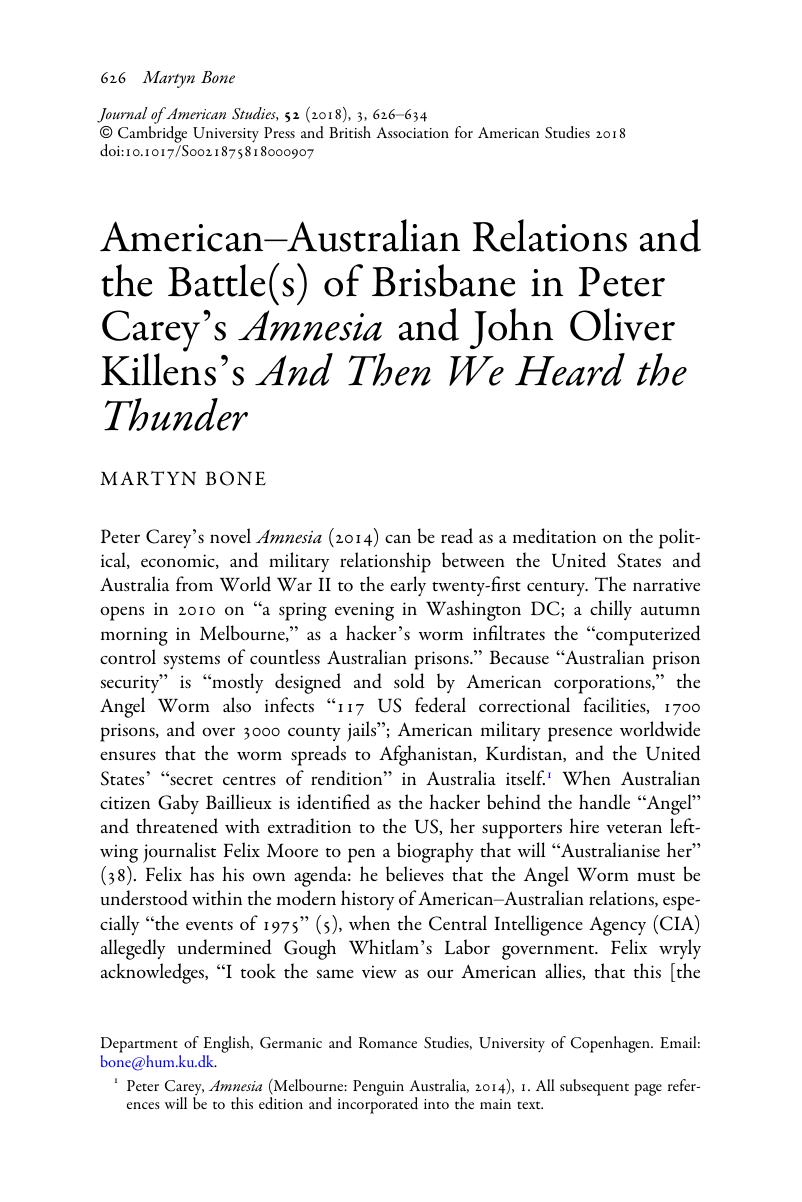No CrossRef data available.
Published online by Cambridge University Press: 03 August 2018

1 Carey, Peter, Amnesia (Melbourne: Penguin Australia, 2014), 1Google Scholar. All subsequent page references will be to this edition and incorporated into the main text.
2 Under Whitlam's government, Australia condemned US bombing of North Vietnam and recognized China, which Felix claims “caused Nixon to order the CIA review of US policy towards Australia” (136). Felix also believes that Australians were blind to CIA subversion of the Whitlam government because they remained grateful for US intervention in World War II.
3 Evans, Raymond and Donegan, Jacqui, “The Battle of Brisbane,” Politics and Culture, 4 (2004)Google Scholar, at http://politicsandculture.org/2010/08/10/the-battle-of-brisbane-by-raymond-evans-and-jacqui-donegan-2, accessed 6 Feb. 2017.
4 Amnesia’s Brownout Strangler is also based on a historical case: American soldier Edward Leonski assaulted and murdered three Australian women in Melbourne during 1942. Whereas Carey's Willenski is murdered by Australian prisoners, Leonski was hanged by the United States after a military trial – another example of the US power in and over Australia that Felix critiques. See Barry Everingham, “US Response to Evil of Brownout Strangler,” The Australian, 31 March 2007, at www.theaustralian.com.au/news/world/us-response-to-evil-of-brownout-strangler/story-e6frg6so-1111113255749, accessed 6 Feb. 2017.
5 Killens, John Oliver, “The Black Psyche,” in Killens, Black Man's Burden (New York: Trident, 1965), 16Google Scholar; Killens, “The Half Ain't Never Been Told,” quoted in Wald, Alan M., Trinity of Passion: The Literary Left and the Antifascist Crusade (Chapel Hill: University of North Carolina Press, 2007), 53CrossRefGoogle Scholar.
6 John Oliver Killens, “Battle of Brisbane,” Box 28, Folder 4, John Oliver Killens Papers, Stuart A. Rose Manuscript, Archives, and Rare Book Library, Emory University.
7 Hastie quoted in James, Rawn Jr., The Double V: How Wars, Protest, and Harry Truman Desegregated America's Military (New York: Bloomsbury, 2013), 144–45Google Scholar.
8 Saunders, Kay, “In a Cloud of Lust: Black GIs and Sex in World War II,” in Damousi, Joy and Lake, Marilyn, eds., Gender and War: Australians at War in the Twentieth Century (Cambridge: Cambridge University Press, 1995), 178–90Google Scholar, 187.
9 Killens, John Oliver, And Then We Heard the Thunder (New York: Alfred Knopf, 1963), 374Google Scholar. All subsequent page references will be to this edition and incorporated into the main text.
10 Hurley quoted in Saunders, 180.
11 March 1942 US Army report and MacArthur both quoted in Saunders, 182, 184.
12 Giles, Paul, Antipodean America: Australasia and the Constitution of U.S. Literature (New York: Oxford University Press, 2013), 366Google Scholar.
13 Saunders, 184.
14 Stecopoulos, Harilaos, Reconstructing the World: Southern Fictions and U.S. Imperialisms, 1898–1976 (Ithaca, NY: Cornell University Press, 2008), 109Google Scholar.
15 Saunders, 180.
16 Gilyard, Keith, John Oliver Killens: A Life of Black Literary Activism (Athens: University of Georgia Press, 2010), 167Google Scholar.
17 Giles, Paul, The Global Remapping of American Literature (Princeton, NJ: Princeton University Press, 2011)Google Scholar, 1, 12; Jameson, Fredric, “Globalization and Political Strategy,” New Left Review, 4 (July–Aug. 2000), 49–68Google Scholar, 50.
18 Amnesia is thus commensurate with Giles's reading of Carey's career up to The Chemistry of Tears (2012) as exhibiting the author's “understanding of transnationalism as a contrarian phenomenon … Carey has a keenly developed understanding of how national territories intersect with global systems.” Giles, Antipodean America, 442–43.